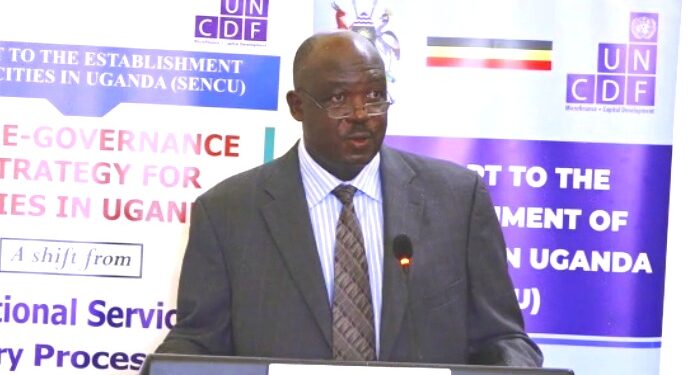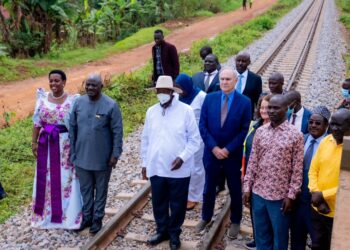The Ministry of Local Government has asked leaders of the recently created cities to embrace City E-Governance Strategy to avoid stagnation and enhance rapid development.
Speaking during an engagement meeting with key stakeholders of the 10 new cities at Mestil Hotel on Friday, John Genda Walala the Director- Local Government Inspection who represented the Minister for Local Government Raphael Magyezi said the ministry with the help of the United Nations Capital Development Fund (UNCDF) as consultants, designed an electronic governance strategy for cities in Uganda to define publication of information technology and the integration processes of improving service delivery.
Mr Genda added that in considering the strategic importance of cities as engines of economic empowerment across the formation, the ministry realized the need for the cities to match another trend of changes in digital technologies in the country.
“Preparing this strategy was to ensure that cities use E-governance and management of affairs. As I said earlier, this year, changes are going to continue as they were expected. So it’s not something new that’s coming to us. I think now about 25 years the government started protecting reforms in our sectors. So this is another but we think we have to improve service delivery for the citizens by using other direction towards improvement and sustainable service delivery. This strategy will facilitate a shift from the traditional government processes to the digital revolution,” he said.
Mr Genda further informed the stakeholders (city mayors and town clerks) that the E-governance Strategy will only work if they embrace it and inform their people about it because the ministry believes that the implementation of the strategy will require the involvement of community leadership to create innovative cities with emphasis to resource mobilization.
“I would like to appreciate the United Nations Capital Development Fund for mobilizing financial resources consultancy to prepare the city governance strategy for cities in Uganda, you know UNCDF has been really helpful in many innovations. This is one of the latest. ”
Chris Lukolyo, Digital Country Lead at UNCDF asked leaders to start seeing digital technology, not as a luxury but a necessity that is currently transforming the world.
“At UNCDF, as we implement this programme on leaving no one behind in the digital era, it did not make sense to try and implement that programme, while leaving out you, the city mayors, representatives who serve these individuals. It is in this context that we thought it would be useful to look at how can your cities leverage digital technologies to serve their citizens because if we can achieve that, we’re much closer to achieving the goal, leaving no one behind in the digital era.”
In regard to vision 2040, the government created ten cities that became operational on 1st July 2020. The cities are Arua, Mbarara, Gulu, Jinja, Fort Portal, Mbale, Masaka, Lira, Soroti and Hoima which operate under the Local Governments Act and the guidance of the National Urban Policy.
About 20 per cent of Uganda’s population lives in urban Centres (national urban policy, 2013). This number is projected to increase to 30 percent by 2035 and according to UNCDF, the high rate of urbanization calls for the use of digital technologies to deliver services by the cities. The National Development Plan III identifies Information Computer Technology as a fulcrum of development, an accelerator, amplifier, and augmenter of change thus coming up with a city e-Governance Strategy to provide a Roadmap and guide the Digital Transformation of city services in Uganda into an inclusive digital society where all city residents and visitors can benefit from the opportunities offered by digital technologies to improve their quality of life.
Do you have a story in your community or an opinion to share with us: Email us at editorial@watchdoguganda.com













